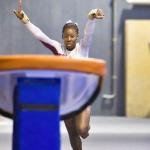
Intensity Differs for Everyone
There’s been a lot of communication lately with parents wanting to better understand their child’s intensity and what is ideal. Seemingly the big thing right now for parents of kids from a variety of sports is the fist pump, or the display of intensity. Parents and coaches sometimes think that if their athlete doesn’t do the fist pump, it means they don’t have enough fire or intensity. One parent asked me if this is something a child is born with or if it can be developed.
The definition of intensity includes – great energy, strength, concentration, vehemence. Fist pump is one example of how they might display intensity, or you they might cheer, jump, cry, laugh, or they may just keep their focus and display nothing. Kids can learn how to be more intense if that is what they need, however, everyone can display it differently and that may or may not include a fist pump.
The fist pump is not for everyone
Just because your child doesn’t do the fist pump, it doesn’t mean there’s something wrong with them. Parents fear that their child not doing it means they don’t have the fire and drive they need to compete but that’s simply not the case. Outward expressions such as this work for some athletes but not others. Everyone displays emotion differently and has a different personality.
Everyone has their own way of showing intensity.
Intensity is an individual thing. It’s really all about what is going to work for an athlete. Athletes who are more extroverted tend to like and show outward displays of emotion like the fist pump, because they enjoy drawing people into their competition and feeling the support this sometimes produces from spectators. Athletes who are more introverted don’t like to draw attention to themselves and so are not inclined to do something that would draw attention to them. There are some athletes in the middle who may occasionally do a fist pump for a variety of reasons.
Intensity, fire, and drive don’t have to come from outward expressions. There are players like Roger Federer, who occasionally does a fist pump, but shows his intensity through a calm, positive approach throughout a match, whether he wins or loses the point.
Over or under intense
I work with clients on intensity – before and during practice and competition – and that may or may not include any outward expression. Again, it depends on an individual’s optimal zone of functioning – where do they perform their best. We work on finding that zone and work on ways to get and keep them in that zone. Some athletes need to be more calm and relaxed, while others need to energize themselves. That may be different based on their personality, their style, the way they process thought, or just simply how they feel.
Body language
During competition, you can use certain body language to your advantage. For example, reading a competitor’s body language can you give you a competitive advantage. Showing up to competition with positive body language can also give you a competitive advantage not only because of how others interpret it but for how it makes you feel.
The fist pump, while a form of body language, can be used and viewed as positive or negative. It can be difficult to interpret sometimes. Don’t get me wrong, if you are fist pumper, it is good if it works to your advantage and you are using it because it does work and you are comfortable with it.
Find out more tips and advantages with positive body language.
Intensity can be learned
Is a child born with intensity? I think kids are born with certain genes that lead them to naturally be more intense, but I also think it’s a learned behavior. It’s a combination. I’ve had many parents ask if I can help their child develop more intensity. The answer is yes if that’s what’s going to help them perform optimally and that intensity may or may not include a fist pump.
I cannot stress enough that each performer has a different face for intensity. It is their own and what works best for them personally.




